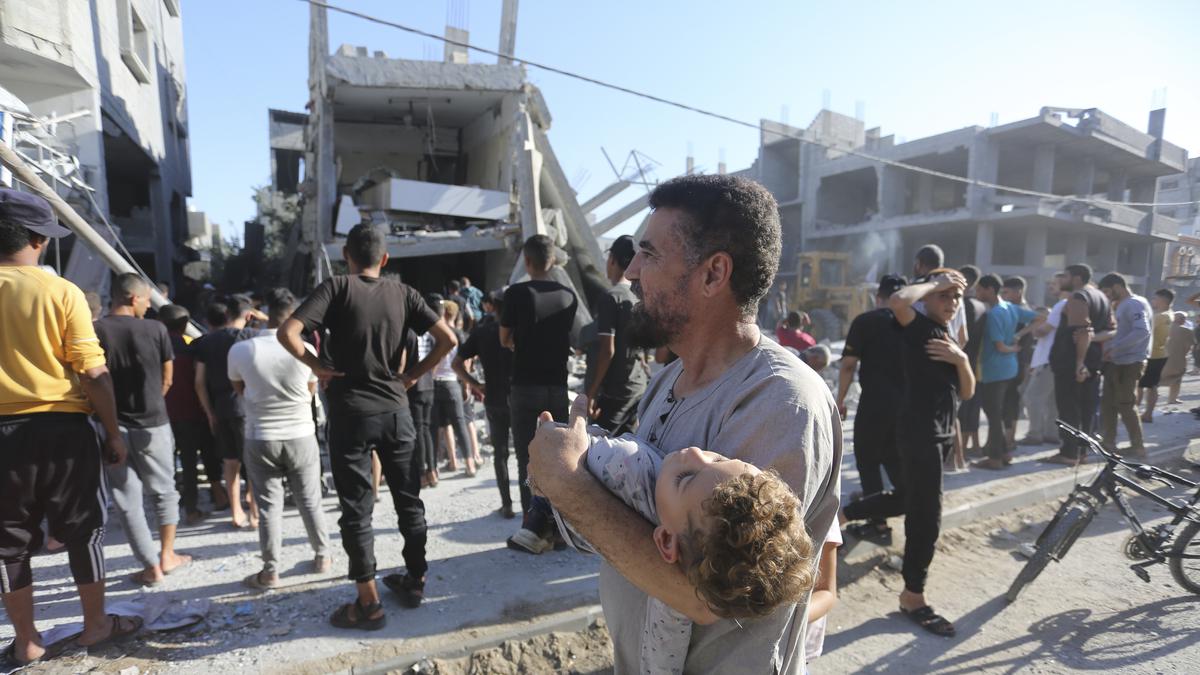
The voice of a Gaza under occupation Premium
The Hindu
As far as Israel and Palestine are concerned, nothing has been achieved towards the idea of two states, from 1948 until today
While the conflict rages in Gaza amidst allegations and counter-allegations, and in the midst of unabashed American partiality, it is relevant to recall what the senior leader of Hamas, Mousa Abu Marzouk, told The New Yorker magazine (October 13) about the political approach: “We rolled down all of the pathways to get some of our rights — not all of them. We knocked on the door of reconciliation and we weren’t allowed in. We knocked on the door of elections and we were deprived of them. We knocked on the door of a political document for the whole world — we said, ‘We want peace, but give us some of our rights’ — but they didn’t let us in.” He added, “We tried every path. We didn’t find one political path to take us out of this morass and free us from occupation... We spoke to the Americans, Europeans and all of the people in order to achieve the Palestinian people’s rights, without any benefit. Nothing has been achieved towards the idea of two states, from 1948 until today. We are a people under occupation.”
Abu Marzouk added that in earlier conflicts, the Israelis waged wars outside their borders; “This is the first time that the Palestinians are crossing the borders and fighting in their historic land.” The conflict has shattered the aura of invincibility.
The Israeli response to the Hamas attack has been to order the evacuation of the northern half of Gaza, to enforce it by a blockade, by the cutting off of food, water and electricity as also by the massing of 3,00,000 troops on Gaza’s border. The objective presumably is to occupy the northern zone and expand space for new settlements. The Palestinians see it as such and recall the manner in which the state of Israel came into existence on May 14, 1948 when 6,56,000 Arabs inhabited of the Mandate Territory of Palestine were made to flee by what the historian, Paul Johnson, called (History of the Jews, p.521) as ‘the scientific use of terror to break the will of liberal rulers’. Palestinians were thus made to pay for the genocide of Jews in Europe which was committed by Germans, not Arabs.
Nor should the ideological motivation, particularly of the present Israeli leadership, be overlooked. It has repeatedly equated the Palestinians with the Nazis who should be eliminated. This is a reiteration of what Vladimir Jabotinsky, a respected predecessor in right-wing Zionism said in 1923: Zionism ‘is a colonizing adventure and therefore it stands or falls by the question of armed force.’ He predicted that the Palestinian will not leave his land unless confronted ‘by a wall of Jewish bayonets so that a new race, proud, generous and cruel, shall arise.’
The reality of this perception has been reinforced by decades of connivance by world powers. Innumerable United Nations Security Council (UNSC) resolutions have remained unimplemented. Each reiterated the earlier ones and some even indicated new goalposts; each sought to explain away the guilt of the culprits. Resolution 2334 of December 2016, for instance, outlawed all settlement activity and reiterated the desirability of implementing the two-state solution.
A departure from the UNSC route was attempted in September 2020 by the Abraham Accords seeking, piously, to ‘end radicalization and conflict’ while ignoring the causes of both. An expectation of expanding the ambit of both has not materialised.
Israel’s objectives for the Gaza operation have been officially identified with precision: toppling Hamas and destroying its military capabilities; eliminating the threat of terrorism emanating from the Gaza strip; exerting maximum pressure to find a solution to the hostage issue, and defending the borders of the state and its citizens. These would require going into Gaza. Informed Arab columnists like Abdel Bari Atwan are of the opinion that the most recent fighting has deprived Israel of its two most effective weapons: its scariness and its deterrent power. Such a move, he says, would be more far reaching than Ehud Olmert’s foray and Ariel Sharon’s venture.

When reporters brought to her notice the claim by villagers that the late maharaja of Mysore Sri Jayachamaraja Wadiyar had gifted the land to them, Pramoda Devi Wadiyar said she is not aware of the matter, but sought to assure people that no effort will be made to take back the land that had been gifted by the late maharaja.





















 Run 3 Space | Play Space Running Game
Run 3 Space | Play Space Running Game Traffic Jam 3D | Online Racing Game
Traffic Jam 3D | Online Racing Game Duck Hunt | Play Old Classic Game
Duck Hunt | Play Old Classic Game










